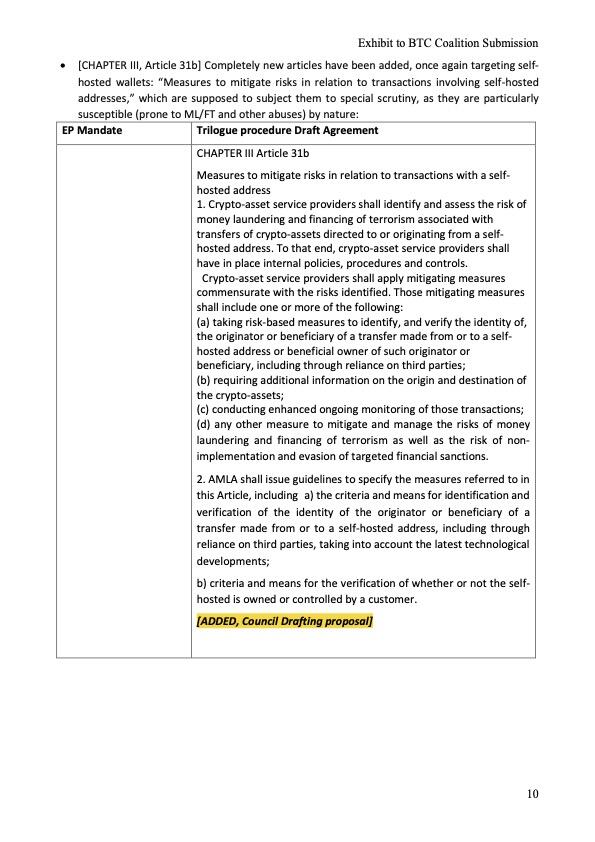lyuda_kozlovska on Nostr: 3. #EU #AML PROPOSAL TARGETS PRIVACY PAYMENT INSTRUMENTS AND FREEDOM TOOLS The ...
3. #EU #AML PROPOSAL TARGETS PRIVACY PAYMENT INSTRUMENTS AND FREEDOM TOOLS
The current AMLR version specifically targets self-hosted wallets, ignoring their role as vital financial tools as #Bitcoin for millions of activists facing financial oppression.
Labeled high-risk, self-hosted wallets are now seen as significant money laundering and terrorist financing facilitators. Changes include revisions to Recitals (20) and (21) and the addition of Article (31b) in Charter III, which increases operational and compliance costs, affecting business strategies and client relationships.
The consequences for EU users of self-hosted wallets are serious. Additional compliance checks will complicate, if not block, the conversion of crypto-assets to fiat currency for activists and civil society members already facing financial exclusion. The AMLR overlooks the crucial role of self-hosted wallets in transferring funds to non-democratic or conflict regions, exposing donors and recipients to repression by authoritarian regimes using AML/CFT laws (e.g., in #Belarus, #Kazakhstan, #Turkey).
Smaller clients with self-hosted wallets, viewed as higher risks under Article (31b), may be deprioritized or excluded due to higher transaction compliance costs. This makes them economically unviable for financial institutions, which often favor larger, lower-risk clients for efficiency. The latest AMLR version could effectively ban self-hosted wallets in the EU, significantly impacting the cryptocurrency sector and those vulnerable to oppression.
See our reaction in our Submission: https://en.odfoundation.eu/a/725781,building-true-change-btc-coalition-submission-on-the-eu-proposal-for-a-regulation-on-the-prevention-of-money-laundering-or-terrorist-financing/

The current AMLR version specifically targets self-hosted wallets, ignoring their role as vital financial tools as #Bitcoin for millions of activists facing financial oppression.
Labeled high-risk, self-hosted wallets are now seen as significant money laundering and terrorist financing facilitators. Changes include revisions to Recitals (20) and (21) and the addition of Article (31b) in Charter III, which increases operational and compliance costs, affecting business strategies and client relationships.
The consequences for EU users of self-hosted wallets are serious. Additional compliance checks will complicate, if not block, the conversion of crypto-assets to fiat currency for activists and civil society members already facing financial exclusion. The AMLR overlooks the crucial role of self-hosted wallets in transferring funds to non-democratic or conflict regions, exposing donors and recipients to repression by authoritarian regimes using AML/CFT laws (e.g., in #Belarus, #Kazakhstan, #Turkey).
Smaller clients with self-hosted wallets, viewed as higher risks under Article (31b), may be deprioritized or excluded due to higher transaction compliance costs. This makes them economically unviable for financial institutions, which often favor larger, lower-risk clients for efficiency. The latest AMLR version could effectively ban self-hosted wallets in the EU, significantly impacting the cryptocurrency sector and those vulnerable to oppression.
See our reaction in our Submission: https://en.odfoundation.eu/a/725781,building-true-change-btc-coalition-submission-on-the-eu-proposal-for-a-regulation-on-the-prevention-of-money-laundering-or-terrorist-financing/


